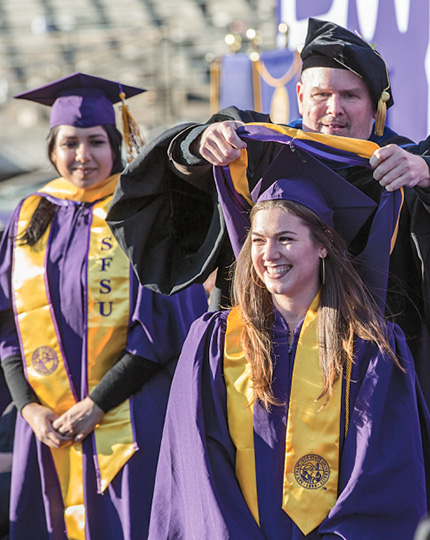Cell Growth

This fall, Hart continued her studies in a Ph.D. program at Harvard University. She hopes to spread her love of science to others — and to female students from underrepresented communities in particular.
Talia Hart (B.S., '17) wasn’t pursuing a degree in the sciences when she came to SF State as a freshman. In fact, her major during her first year was communications because she wasn’t sure she wanted to spend all of her time inside a lab. Biology 100: Human Biology — a class intended for non-science majors — changed everything. The course fired Hart up so much about biology she eventually applied to the Maximizing Access to Research Careers program (MARC), which supports underrepresented minority undergraduates in biomedical science and prepares them for Ph.D. programs. She also became an active member of the Society for Advancing Chicanos/Hispanics and Native Americans in Science and worked to recruit other minorities.
Eventually Hart not only graduated with a bachelor of science degree in biology, as the College of Science & Engineering's academic hood at the 2017 Commencement ceremony at AT&T Park she spoke on behalf of all undergraduate degree recipients. Her speech, excerpted here, combined the love of biology she discovered at SF State with a heartfelt message for her fellow Gators — and anyone else who's determined to thrive in spite of adversity.
My time at SF State was filled with learning experiences in and out of the classroom. For the past three years, I worked in Dr. Carmen Domingo’s research laboratory on campus. I immersed myself in the field of developmental biology, fascinated by what commits a cell to take on a certain identity. I can’t help but compare our journey to graduation to this fundamental process in biology.
The study of embryonic cells in early development and their path to maturity is one that is complex, chaotic, but beautiful in its orchestration. A stem cell has the potential to become a part of any tissue in the body, but there can be roadblocks, delaying a cell from getting to its destination, as well as influences that redirect a cell to a new path. But the overall result is communities of cells: tissues and organs that make a cohesive body.
We started our first day, like these stem cells, able to be molded into anything. This uncertainty was exciting yet nerve-racking, as our fate was yet to be determined. Once we began our courses eventually a path became clear. This new sense of direction propelled us; our self-motivation grew and sustained us.
However, like the stem cells, we had obstacles that challenged us and distractions that sidetracked us without deterring us. Our journey has not been without the pressure of self-doubt. In these times, we relied on the influence of others. First, the inspiration from our family and community to better the lives we live and to keep on this demanding journey. Second, from our professors and colleagues that imposed knowledge upon us to give us the resources to mature.
These influences defined us.
The path of a stem cell is also strongly persuaded by its environment. The needs of the body define what type of cell the stem cell needs to turn into. SF State has challenged us to be who we need to be in our destined path and in the world. Our environment has cultivated self-discovery and a platform for social justice. We are the future leaders, doctors, activists and philanthropists.
I began SF State willing to pursue several different paths. I found biology at the end of my freshman year. I faced obstacles: I failed Organic Chemistry and had financial burdens. But I relied on myself and my community to push me forward. I took an extra year to grow. I leave SF State a more reflective and conscientious person. I owe my perseverance and success to my colleagues who went through it with me.
Everyone begins as a stem cell. Molded by our experiences at SF state, challenged along our way as we create our defined path, we relied on positive influences from our environment. Like stem cells acting as agents of change in the body, it is our responsibility as we leave SF State to act as these agents to build a strong, united community.